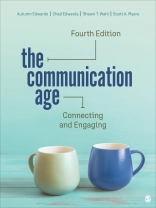When should you send a text message, and when is it more appropriate to talk face-to-face? What is the best way to prepare for a job interview that will be conducted over video? How should you modify your speech if it will be recorded and posted online?
The Communication Age: Connecting and Engaging introduces students to the foundational concepts and essential skills of effective communication, with a strong emphasis on the impact of technology in our increasingly interconnected world.
This new
Fourth Edition helps students become involved in our diverse global community and learn how to apply key principles of effective communication—whether incorporating media, technology, or traditional face-to-face speech communication—to foster civic engagement for a better future. With comprehensive coverage of the essentials of interpersonal, small group, and public communication, this text is ideal for use in hybrid introduction to communication courses.
表中的内容
Chapter 1. Communication in the 21st Century
Chapter 2. Perception, Self, and Communication
Chapter 3. Verbal Communication
Chapter 4. Nonverbal Communication
Chapter 5. Listening
Chapter 6. Communication, Culture, and Diversity
Chapter 7. Interpersonal Communication
Chapter 8. Small Group and Team Communication
Chapter 9. Workplace and Organizational Communication
Chapter 10. Communication and New Media
Chapter 11. Selecting and Researching Your Topic and Knowing Your Audience
Chapter 12. Organizing Your Presentation
Chapter 13. Delivering Your Presentations
Chapter 14. Informative Presentations
Chapter 15. Persuasive Presentations
关于作者
Scott A. Myers (Ph D, Kent State University) is a professor and Peggy Rardin Mc Connell Chair in the Department of Communication Studies at West Virginia University (WVU) where he teaches courses in instructional communication, organizational communication, and communication pedagogy. His research interests center primarily on the student-instructor relationship in the college classroom and the adult sibling relationship, with his research appearing in outlets such as Communication Education, Journal of Family Communication, Communication Research Reports, and Communication Quarterly, among others. At WVU, he was recognized by the Eberly College of Arts and Sciences as a Woodburn Professor (2005–2007) and as an Outstanding Teacher in 2010. He is a former editor of Communication Teacher, a former executive director of the Central States Communication Association (CSCA), and a past president of CSCA.












